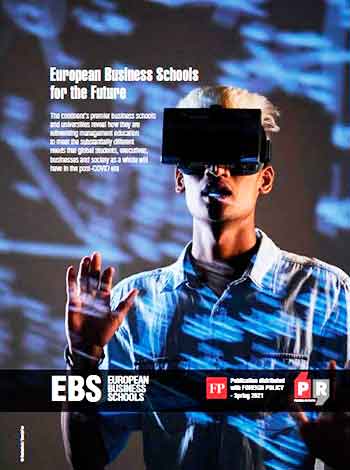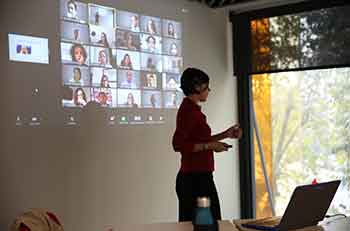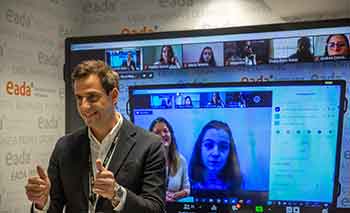European business schools enter an era of reinvention
The spring edition of the prestigious global political and economic magazine ‘Foreign Policy’ features a report on the reinvention of European business schools in the post-COVID era. The report, ‘European business schools for the future’, describes the challenges that leaders in management education face as they strive to meet the new needs of global students, executives, businesses and society as a whole. Deans, rectors and presidents of the continent’s premier universities and business schools share their experience in facing the challenges of the pandemic. In the report, EADA Business School Dean Jordi Díaz highlights 3 key points of the institution’s approach to the post-Covid reality.
1. The move towards lifelong learning
 Research says that we will have to recycle every five years. “The old model in which you just spent 3 to 4 years completing your bachelor’s degree is transforming,” says Dean Díaz. “Business schools have to understand that their services will not be limited to one moment in a student’s development, but rather they should work towards a goal of serving consistently throughout their careers.”
Research says that we will have to recycle every five years. “The old model in which you just spent 3 to 4 years completing your bachelor’s degree is transforming,” says Dean Díaz. “Business schools have to understand that their services will not be limited to one moment in a student’s development, but rather they should work towards a goal of serving consistently throughout their careers.”
In the same way, at the 2020 World Economic Forum, it was announced that by 2030, 1 billion people would have had to reskill due to technological advances, automation and redundant positions. At the same time, new positions are being created every day. According to Dean Díaz, “We will most likely not be able to wait until 2030; we will need to accelerate that date to 2025.” He adds: “In a world that has an imperative need for reskilling and upskilling, business schools have the potential to be the facilitators of a reinvention of the workforce. To do this, we have to embrace cooperation not only among universities and business schools, but with the corporate world as well. Tech companies, corporations and governments –working together-- can offer the best experience to the talent of tomorrow.”
One consequence of the changing demands of the workforce is the rising importance of executive education, short courses and micro-degrees. EADA Business School has adapted to this ‘new normal’ by implementing our Immersive Learning methodology. This methodology anticipates all possible scenarios and ensures the continuity and quality of learning by providing access to learning any time anywhere. “EADA’s mission to be the place where business people grow hasn’t changed,” says Dean Díaz, “but we strongly believe that the excellence our professors achieve in face-to-face sessions can and must be replicated online.”
This commitment can be seen in EADA’s increasing portfolio of new online programmes designed to respond to the new needs of companies and to promote the skills most in-demand in cutting-edge sectors. The MBA Online EADA-UOC, the Online Master in Analytics, Big Data and Artificial Intelligence Management and the Online Master in Innovation and Business Sustainability are just some examples of the EADA’s diverse online offering. EADA has also recently launched short, online programmes that function as bootcamps called EADAx. These programmes are aimed at professionals who want to dive into new trends and enhance skills in three essential areas: leadership, innovation and technology.
2. Greater personalisation of the learning experience
 More than ever, EADA is focused on improving student’s experience by adopting a greater personalisation. “Our top priority is that our participants live a unique experience on campus,” Dean Díaz says. “We are well known for our boutique approach and signature small class size, and this has become even more important post-Covid.” During the pandemic, EADA successfully managed 400 full-time students divided into 15 parallel classes of 28-30 participants. The diversity of profiles in class added to the richness of the experience on campus, with more than 55 nationalities in class this year along and over 50% of faculty from abroad.
More than ever, EADA is focused on improving student’s experience by adopting a greater personalisation. “Our top priority is that our participants live a unique experience on campus,” Dean Díaz says. “We are well known for our boutique approach and signature small class size, and this has become even more important post-Covid.” During the pandemic, EADA successfully managed 400 full-time students divided into 15 parallel classes of 28-30 participants. The diversity of profiles in class added to the richness of the experience on campus, with more than 55 nationalities in class this year along and over 50% of faculty from abroad.
Participants today want to know that they will get the same individual attention and resources when it comes to their professional goals post-graduation. For this reason, EADA Careers provides support to current students as well as alumni to ensure that they are prepared to succeed. From the very first day, current participants are in contact with EADA’s alumni community –more than 120,000 former students from 87 countries– and relevant recruiters, both nationally and internationally.
3. Leadership that is more sustainable
The current generation of students is looking to work in companies or launch businesses that combine profit with purpose, and this goal has only been amplified by the pandemic. Business schools such as EADA, which are committed to social and environmental issues, should act as models of best practices and integrate a sustainable mindset into the classroom.
EADA is pioneer in enabling socially responsible leaders, launching the first Master in Sustainable Business & Innovation. This first edition of this full-time programme took place three years ago, before any other top-tier business school in Europe. “We have seen a big increase in young people who want to change the world as well as senior leaders that are adopting a more sustainable mindset,” confirms Dean Díaz. “This puts sustainability –and the technology that makes sustainable practices possible– at the very top of their minds. Graduates of master’s like ours could end up working at the United Nations, NGOs or leading corporations, or they could become social entrepreneurs or innovators.”
 Sustainability is seen as a core value in the post-pandemic recovery, leading companies to review their activities and practices more closely than ever before. Future leaders will have a unique opportunity to contribute to this shift, and EADA’s students will have the leadership skills to make sustainable practices a reality. Participants take part in full-immersion leadership development modules to define their main purpose in leading themselves, leading teams and leading in society. According to Jordi Díaz, the classroom is not the only learning space where participants shape and develop that purpose: “Through the EADA community, we also make sure that there are curricular and extracurricular experiences related to social and environmental issues, mixing students from different programmes and nationalities and engaging with external stakeholders. The Sustainability Week and the MiM Innovation Challenge are some good examples.”
Sustainability is seen as a core value in the post-pandemic recovery, leading companies to review their activities and practices more closely than ever before. Future leaders will have a unique opportunity to contribute to this shift, and EADA’s students will have the leadership skills to make sustainable practices a reality. Participants take part in full-immersion leadership development modules to define their main purpose in leading themselves, leading teams and leading in society. According to Jordi Díaz, the classroom is not the only learning space where participants shape and develop that purpose: “Through the EADA community, we also make sure that there are curricular and extracurricular experiences related to social and environmental issues, mixing students from different programmes and nationalities and engaging with external stakeholders. The Sustainability Week and the MiM Innovation Challenge are some good examples.”
With the goal of promoting sustainable leadership, business schools have strengthened their alliances with corporations and movements committed to making a positive impact in society. EADA collaborates with B Corps, the movement that certifies businesses based on their financial profitability as well as the sustainable impact that they have on the planet and its people. This year, EADA has also partnered with Ashoka, the leading organisation for promoting and supporting social entrepreneurship. “Both of these organisations now form part of our business education ecosystem, an ecosystem that is constantly changing and growing,” says Dean Díaz. It is partnerships like these that has led to EADA’s being recognised among the top schools in sustainability. In the recent Positive Impact Rating, EADA was among 9 schools rated at ‘Level 4 - Transforming schools’. The rating is carried out by the Positive Rating Association, based in Davos (Switzerland), with the support of the United Nations Global Compact.
